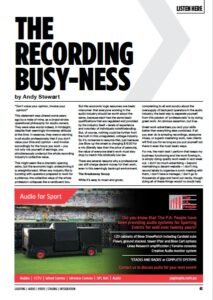News
20 Jun 2019
The Recording Busy-Ness

Subscribe to CX E-News
LISTEN HERE
The Recording Busy-Ness
by Andy Stewart.
“Don’t voice your opinion, invoice your opinion!”
This statement was uttered some years ago by a mate of mine, as a broad-stroke operational philosophy for studio owners. They were wise words indeed, in hindsight, despite their seemingly throwaway attitude at the time.
In essence, they were a warning to all studio professionals; that if you don’t value your time and opinion – and invoice accordingly for the hours you work – you not only rob yourself of earnings, you simultaneously undercut the whole recording industry’s collective value.
This might seem like a dramatic opening salvo, but the economic logic underpinning it is straightforward. When any industry fills to bursting with operators prepared to work for a pittance, the collective value of the whole profession collapses like a cardboard box.
But this economic logic assumes one basic misnomer: that everyone working in the audio industry should be worth about the same, because each has the same basic qualifications that are regulated and provided by the industry itself – levels of experience and notoriety of individuals notwithstanding.
But, of course, nothing could be further from the truth in this unregulated, cottage industry. So it’s nonsense to assume that, just because Joe Blow up the street is charging $19.50 for a mix (literally less than the price of peanuts), the value of everyone else’s work must also drop to match this idiotically low bar.
There are several reasons why a professional can still charge decent money for their work, even in this seemingly bankrupt environment.
The Breakaway Group
While it’s easy to moan and groan, complaining to all and sundry about the oversupply of backyard operators in the audio industry, the best way to separate yourself from this peloton of ‘professionals’ is by doing great work.
An obvious assertion, but true.
Great work advertises you and your skills better than everything else combined. If all you ever do is amazing recordings, awesome mixes, or superb mastering work, new clients will find you for as long as you put yourself out there in even the most basic ways.
For me, the main task I perform that keeps my business functioning and the work flowing in, is simply doing quality work week in and week out. I don’t do much advertising – beyond maintaining a decent website – I don’t ring record labels to organise a lunch meeting with them, I don’t have a manager, I don’t go to thousands of gigs and hand out cards, though doing all of these things would no doubt help my profile.
What I do is apply my craft to the best of my ability every single time I’m at the console. I bill for the hours I work, and that is that.
From there, the albums I work on go out into the world with my name on them. Occasionally one develops a high profile, and with the aid of my website, which has a bunch of examples of my work on it for people to cross-check, new clients can seek me out as and when they need to employ my expertise.
(It’s important to add here that in an almost label-less online marketplace, where hard copies of CDs and vinyl represent only a small percentage of what’s sold or heard by the public, your name on any credits list tends to be lost or swept aside most of the time, making your website archive a vitally important component of your business.)
Choose Your Market
The way I see my business model – basic and naïve though it may be – is this: there are always new clients out there (as well as experienced ones that return again and again) that want to sound brilliant and are prepared to pay for it.
When these people go searching for someone with whom they can achieve quality results, that’s when having runs on the board and countless great albums in the archive, pays dividends.
In short (and apologies for blowing my own trumpet here), because I’m confident in my ability to produce great musical and sonic outcomes, some artists – certainly not all – are happy to pay for the work I do, secure in the knowledge that their outlay will result in a great sounding product.
I don’t compete with the $19.50 mix brigade, because the customers attracted to this peanut price point are typically driven wholly by cost rather than quality, and don’t necessarily yet understand the difference between a good engineer and a shonky one. That may change for them over time, but for now at least, they aren’t really looking for me in the first place.
I have no issue whatsoever with that, per se, but as a professional, there’s little economic advantage in me competing for their dollar (unless, as a producer, I think I hear a star in the making, at which point increased royalty percentages on a contract can sometimes make up for the lack of production funds).
Moreover, I know my working methods pretty well by now. After so many years at this caper, my tendency is to work hard to produce great sounding albums every single time, even if the budget is small. While this is a strength on the one hand, economically it tends not to be!
Given my track-record for making things sound good at any cost (even if it’s mine!), taking on low-budget projects potentially robs me of income because the work takes about the same amount of time – sometimes longer, effectively lowering my daily rate – and often sinks without a trace once released. Neither of these factors is good for business.
Every Product Leaves Sounding Awesome
Nevertheless, doing great work is vitally important to the long-term health of your reputation as a producer or engineer. Though it’s hard to control in this fickle industry, your reputation, alongside the products you produce, is effectively all you have to trade on in the recording industry.
Over the long haul it is therefore crucial that you always prioritise the quality of your craftsmanship over other considerations, because it sets you apart from the pack. Not only will this allow you to maintain your income, it will keep you interested in the job, allow you to grow your skill set, buy and maintain your equipment, and hone your craft.
By constantly improving your technical and artistic abilities, remaining humble, open-minded and never becoming complacent about how awesome you are, your work will almost inevitably improve. On the other hand, convince yourself that you know it all, and the death knell will ring faster than a meteorite strike.
The Back-Catalogue
One last thing to note is that your work lingers. People discover music you’ve crafted at different times, in some cases several years, even decades, out of sync from your personal involvement with it. So it’s important to maintain the quality of your work, lest it be out there undermining your reputation without you even knowing it.
It’s great having fantastic music out there that’s commercially successful, artistically brilliant or cool in some particular way. When people associate you with any of this noteworthy stuff, you hear about it all the time. But juxtaposed to this; if there’s any poorly produced, badly edited, dodgily mixed work floating around out there with your name pinned to it, you almost never hear about it. You just miss out on the next well-paid job.
So don’t be fooled into thinking you get away with producing poor quality audio, whether that be songs, mixes, or masters. The good and the bad work you produce contribute to the strengthening (or weakening) of your reputation, though in what percentage or measure is hard to say. Either way, only the good work rates a mention to your face. Don’t therefore judge the quality of your work based on what people say about it, but rather by how you honestly evaluate it yourself, and by how many new clients are knocking down the door.
If there’s a stampede of clients heading your way you’re probably doing something right. If, on the other hand, the phone is silent, don’t give up either. Everyone suffers from this periodically. Just know that the best way to improve is to be the first – not the last – to admit you don’t know it all.
Rest assured, no-one does.
Andy Stewart owns and operates The Mill on Victoria’s Bass Coast. He’s a highly credentialed producer/engineer who’s seen it all in studios for over three decades. He’s happy to respond to any pleas for recording or mixing help… Contact him at: andy@themill.net.au
CX Magazine – June 2019 Entertainment technology news and issues for Australia and New Zealand – in print and free online www.cxnetwork.com.au
© CX Media
Subscribe
Published monthly since 1991, our famous AV industry magazine is free for download or pay for print. Subscribers also receive CX News, our free weekly email with the latest industry news and jobs.







